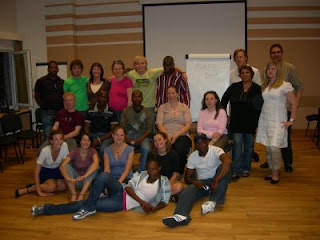
When I first signed up to attend the North South Preparation weekend in March 2008 I had no real idea of where I wanted to volunteer or what I wanted to do, just a vague notion of somewhere exotic and something philanthropistic. My time with Concordia and Uganda Voluntary Development Association (UVDA) spent helping to construct a mud-brick classroom in a remote Ugandan village certainly fulfilled both criteria and more.
Having previously travelled fairly far and wide (think South America, India etc.) I was fairly confident that a trip to Africa wouldn’t be a vastly different experience and should be quite straightforward. Sometimes, however, things don’t always go to plan. Africa was, and is, amazing. I was staggered by the people there and their way of life. The situation there is so far removed from anywhere I had been before, that I almost couldn’t comprehend it. The very core things that I took as absolute were not the same here. You couldn’t get an ambulance in some places, even if you had the money. People didn’t have large families out of choice but out of necessity, it really was survival. People did not plan for the future; sadly, life expectancies can be so low that it doesn’t make sense to save money/invest. Standards of education varied wildly, from learning the internal workings of refrigerators at school (despite there being no electricity for miles around) to not knowing that men had landed on the moon.
Despite all of the above, the people here were happy. And I loved it. Being a foreigner in a remote place meant a lot of attention. The children were great, very hardworking and equally fun-loving. A simple photo, shown on the tiny screen of a digital camera, was enough to send great groups of kids yelling and jumping. The adults were equally pleased to see you, either to practise their English or just to say hello. I’ve never been somewhere were the people were so genuinely friendly.
The project that I was involved with was in collaboration with UVDA. After arriving in the bustling, hectic yet friendly capital of Uganda, Kampala, I met with the organisation’s Director, Rogers. Rogers’ tiny office was in a run-down shack, on the outskirts of town. I remember thinking, “whoops, what have I gotten myself into here then?” Upon entering the dark room I was greeted with a huge bear-hug from a large man who later revealed himself to be Rogers. “Welcome to Uganda! We’re so very happy that you could come!” And it really felt like he meant every word.
(in the picture: the sleeping quarters)
The village was about 150kms east of Kampala and so I was given instructions on how to reach it. The manic journey involved several matatus (shared taxis) and boda-bodas (taxi motorbikes) and a good 8 or 9 hours, but I finally made it in one piece. The village was a marked change from the busy capital, there was no mains electricity for at least 10km in any direction. There was no running water; however, there were several pump-action wells that had been installed by the government. Food variation was hard to come by, the staples being matokee (green bananas) and rice. The occasional chicken could be purchased at great expense if so desired, but after attempting to digest a particularly sinewy and rubbery cockerel we mostly stuck to being vegetarian. In some ways the accommodation exceeded my expectations. We were kindly allowed to stay in a compound building that belonged to one of Uganda’s Chief Justices who grew up in the village and kept the compound as a holiday retreat. The rooms were bare mud and concrete with no glass in the windows, but Uganda’s climate is pleasant enough to not warrant any. There were spare foam mattresses which we gladly accepted and, once our mosquito nets were strung from the wood and straw roof, we had a fairly comfortable place we could call home.
(In the picture: Volunteers at the beginning of the work)
The project itself involved the construction of a new classroom for the village’s government-run school. Education conditions were appalling: one large classroom for over 700 children. Most classes were conducted outside on the grass as the classroom could only hold around 40 children. We worked alongside the local building expert, who directed us in our tasks. One day we may be mixing concrete for mortar, the next day ensuring the bricks are correctly in place. Occasionally we would become more involved with the children, playing frisbee or handing out prizes for the End-of-Term reports, but this was the exception rather than the rule. Perhaps the only disappointing part of the project was how little we managed to achieve in the time allotted. Three weeks was not really enough time to make a big impact on the site and a couple of months would be required to finish the classroom in its entirety. A lack of funding also meant that materials and labour was limited. A small increase would have made a big difference.
(Above: Curious children during the work)
Once again the people could not be faulted. So optimistic, they kept the spirit of the project alive. Without them it would be easy to see it as an exercise in futility, but they made you realise that with hope anything was achievable.
I really enjoyed my time spent in Uganda and would do it all over again without hesitation. Now back in the UK I have more of an idea about which direction I want to head in for the near future. I made several good friends of the other volunteers and, in years to come, I know that I will look back at this project with fond memories.
Adam, Uganda 2008.













